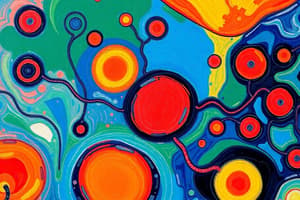Podcast
Questions and Answers
What is the primary pathway by which glucose is metabolized in red blood cells (RBCs)?
What is the primary pathway by which glucose is metabolized in red blood cells (RBCs)?
- Aerobic respiration
- Anaerobic glycolysis (correct)
- Oxidative phosphorylation
- Beta-oxidation
What product is generated by the Hexose Monophosphate Pathway in red blood cells?
What product is generated by the Hexose Monophosphate Pathway in red blood cells?
- ATP
- Lactate
- 2,3-bisphosphoglycerate
- NADPH (correct)
Which enzyme deficiency is most commonly associated with genetic defects in glycolysis in RBCs?
Which enzyme deficiency is most commonly associated with genetic defects in glycolysis in RBCs?
- Phosphoglucose isomerase
- Lactate dehydrogenase
- Pyruvate kinase (correct)
- Hexokinase
What is the result of reduced glycolysis in RBCs due to genetic enzyme defects?
What is the result of reduced glycolysis in RBCs due to genetic enzyme defects?
What is the function of Methemoglobin Reductase in red blood cells?
What is the function of Methemoglobin Reductase in red blood cells?
What is the primary consequence of genetic defects in glycolytic enzymes in RBCs?
What is the primary consequence of genetic defects in glycolytic enzymes in RBCs?
Which pathway generates 2,3-bisphosphoglycerate (2,3-BPG) in RBCs?
Which pathway generates 2,3-bisphosphoglycerate (2,3-BPG) in RBCs?
What is the primary substrate required by the Hexose Monophosphate Pathway in RBCs?
What is the primary substrate required by the Hexose Monophosphate Pathway in RBCs?
What percentage of genetic defects in glycolytic enzymes is attributed to phosphoglucose isomerase deficiency?
What percentage of genetic defects in glycolytic enzymes is attributed to phosphoglucose isomerase deficiency?
What is the main function of NADPH produced by the Hexose Monophosphate Pathway in RBCs?
What is the main function of NADPH produced by the Hexose Monophosphate Pathway in RBCs?
Which protein component constitutes the largest percentage of the RBC membrane?
Which protein component constitutes the largest percentage of the RBC membrane?
The primary end product of anaerobic glycolysis in RBCs is:
The primary end product of anaerobic glycolysis in RBCs is:
Which condition is primarily maintained by the action of Methemoglobin Reductase in RBCs?
Which condition is primarily maintained by the action of Methemoglobin Reductase in RBCs?
What is the role of lactate produced in RBCs?
What is the role of lactate produced in RBCs?
What percentage of RBC membrane is composed of lipid?
What percentage of RBC membrane is composed of lipid?
Flashcards are hidden until you start studying
Study Notes
RBC Membrane Components
- Comprised of proteins (52%), lipids (40%), and carbohydrates (8%).
- Integral membrane proteins are embedded within the membrane.
- Peripheral proteins located on the internal cytoskeleton and external surface contribute to structure and function.
Embden Meyerhof Pathway (Glycolysis)
- RBCs utilize anaerobic glycolysis for glucose metabolism, requiring no mitochondria or oxygen.
- Each glucose molecule yields 2 ATP and produces 2 lactate molecules.
- Lactate enters the bloodstream and is converted back to glucose in the liver.
Genetic Defects in Glycolysis
- Mutations in glycolytic enzymes in RBCs hinder energy production, leading to hemolytic anemia.
- Hemolytic anemia occurs when RBCs lose their biconcave shape, impairing passage through capillaries.
- Pyruvate kinase deficiency accounts for 95% of glycolytic enzyme defects.
- Phosphoglucose isomerase deficiency is responsible for 4%.
Hexose Monophosphate Pathway
- Also known as the Pentose Phosphate Shunt or Phosphogluconate Pathway.
- Functions to detoxify accumulated peroxides within RBCs.
- Produces NADPH, essential for various cellular processes.
- Dependent on Glucose 6 Phosphate Dehydrogenase for its activity.
Glutathione Functionality
- Oxidized glutathione is non-functional, while reduced glutathione is functional in detoxification processes.
Methemoglobin Reductase
- This enzyme maintains iron in the Fe2+ state, crucial for hemoglobin function.
- Cytochrome B5 reductase also plays a role in this reduction process.
Rapaport-Leubering Pathway
- Responsible for generating 2,3-bisphosphoglycerate (2,3-BPG or 2,3 DPG).
- This pathway is significant in regulating hemoglobin's affinity for oxygen.
RBC Membrane Components
- Comprised of proteins (52%), lipids (40%), and carbohydrates (8%).
- Integral membrane proteins are embedded within the membrane.
- Peripheral proteins located on the internal cytoskeleton and external surface contribute to structure and function.
Embden Meyerhof Pathway (Glycolysis)
- RBCs utilize anaerobic glycolysis for glucose metabolism, requiring no mitochondria or oxygen.
- Each glucose molecule yields 2 ATP and produces 2 lactate molecules.
- Lactate enters the bloodstream and is converted back to glucose in the liver.
Genetic Defects in Glycolysis
- Mutations in glycolytic enzymes in RBCs hinder energy production, leading to hemolytic anemia.
- Hemolytic anemia occurs when RBCs lose their biconcave shape, impairing passage through capillaries.
- Pyruvate kinase deficiency accounts for 95% of glycolytic enzyme defects.
- Phosphoglucose isomerase deficiency is responsible for 4%.
Hexose Monophosphate Pathway
- Also known as the Pentose Phosphate Shunt or Phosphogluconate Pathway.
- Functions to detoxify accumulated peroxides within RBCs.
- Produces NADPH, essential for various cellular processes.
- Dependent on Glucose 6 Phosphate Dehydrogenase for its activity.
Glutathione Functionality
- Oxidized glutathione is non-functional, while reduced glutathione is functional in detoxification processes.
Methemoglobin Reductase
- This enzyme maintains iron in the Fe2+ state, crucial for hemoglobin function.
- Cytochrome B5 reductase also plays a role in this reduction process.
Rapaport-Leubering Pathway
- Responsible for generating 2,3-bisphosphoglycerate (2,3-BPG or 2,3 DPG).
- This pathway is significant in regulating hemoglobin's affinity for oxygen.
Studying That Suits You
Use AI to generate personalized quizzes and flashcards to suit your learning preferences.



